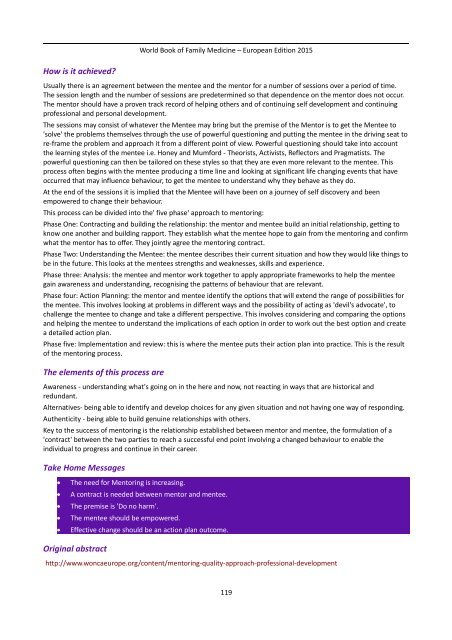Family Medicine
World Book 2015
World Book 2015
Create successful ePaper yourself
Turn your PDF publications into a flip-book with our unique Google optimized e-Paper software.
World Book of <strong>Family</strong> <strong>Medicine</strong> – European Edition 2015<br />
How is it achieved?<br />
Usually there is an agreement between the mentee and the mentor for a number of sessions over a period of time.<br />
The session length and the number of sessions are predetermined so that dependence on the mentor does not occur.<br />
The mentor should have a proven track record of helping others and of continuing self development and continuing<br />
professional and personal development.<br />
The sessions may consist of whatever the Mentee may bring but the premise of the Mentor is to get the Mentee to<br />
'solve' the problems themselves through the use of powerful questioning and putting the mentee in the driving seat to<br />
re-frame the problem and approach it from a different point of view. Powerful questioning should take into account<br />
the learning styles of the mentee i.e. Honey and Mumford - Theorists, Activists, Reflectors and Pragmatists. The<br />
powerful questioning can then be tailored on these styles so that they are even more relevant to the mentee. This<br />
process often begins with the mentee producing a time line and looking at significant life changing events that have<br />
occurred that may influence behaviour, to get the mentee to understand why they behave as they do.<br />
At the end of the sessions it is implied that the Mentee will have been on a journey of self discovery and been<br />
empowered to change their behaviour.<br />
This process can be divided into the' five phase' approach to mentoring:<br />
Phase One: Contracting and building the relationship: the mentor and mentee build an initial relationship, getting to<br />
know one another and building rapport. They establish what the mentee hope to gain from the mentoring and confirm<br />
what the mentor has to offer. They jointly agree the mentoring contract.<br />
Phase Two: Understanding the Mentee: the mentee describes their current situation and how they would like things to<br />
be in the future. This looks at the mentees strengths and weaknesses, skills and experience.<br />
Phase three: Analysis: the mentee and mentor work together to apply appropriate frameworks to help the mentee<br />
gain awareness and understanding, recognising the patterns of behaviour that are relevant.<br />
Phase four: Action Planning: the mentor and mentee identify the options that will extend the range of possibilities for<br />
the mentee. This involves looking at problems in different ways and the possibility of acting as 'devil's advocate', to<br />
challenge the mentee to change and take a different perspective. This involves considering and comparing the options<br />
and helping the mentee to understand the implications of each option in order to work out the best option and create<br />
a detailed action plan.<br />
Phase five: Implementation and review: this is where the mentee puts their action plan into practice. This is the result<br />
of the mentoring process.<br />
The elements of this process are<br />
Awareness - understanding what's going on in the here and now, not reacting in ways that are historical and<br />
redundant.<br />
Alternatives- being able to identify and develop choices for any given situation and not having one way of responding.<br />
Authenticity - being able to build genuine relationships with others.<br />
Key to the success of mentoring is the relationship established between mentor and mentee, the formulation of a<br />
'contract' between the two parties to reach a successful end point involving a changed behaviour to enable the<br />
individual to progress and continue in their career.<br />
Take Home Messages<br />
<br />
<br />
<br />
<br />
<br />
The need for Mentoring is increasing.<br />
A contract is needed between mentor and mentee.<br />
The premise is 'Do no harm'.<br />
The mentee should be empowered.<br />
Effective change should be an action plan outcome.<br />
Original abstract<br />
http://www.woncaeurope.org/content/mentoring-quality-approach-professional-development<br />
119


